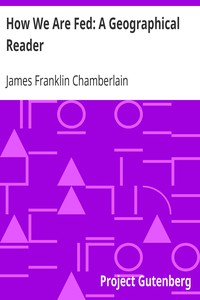How We Are Fed: A Geographical Reader by James Franklin Chamberlain
"How We Are Fed: A Geographical Reader" by James Franklin Chamberlain is an educational publication written in the early 20th century. The work serves as an informative resource aimed at teaching readers, particularly children, about the interconnections between geography, daily life, and the food supply. The book emphasizes how agricultural and industrial practices, spanning various regions, contribute to the food products that reach homes. The opening of the text establishes a foundation
for understanding how human civilization relies on collective labor and specialization to meet basic needs. Chamberlain introduces a stark contrast between primitive living conditions and modern society's structured approach to food production, using examples from historical practices of gathering and hunting to contemporary agriculture and commerce. The reader is invited to explore the journey of basic commodities like bread, meat, and vegetables, mastering how these products are sourced and their significance in fostering a global community connected through trade and cooperation. (This is an automatically generated summary.)
Read or download for free
| How to read | Url | Size | |||
|---|---|---|---|---|---|
| Read now! | https://www.gutenberg.org/ebooks/38762.html.images | 235 kB | |||
| EPUB3 (E-readers incl. Send-to-Kindle) | https://www.gutenberg.org/ebooks/38762.epub3.images | 2.2 MB | |||
| EPUB (older E-readers) | https://www.gutenberg.org/ebooks/38762.epub.images | 2.2 MB | |||
| EPUB (no images, older E-readers) | https://www.gutenberg.org/ebooks/38762.epub.noimages | 150 kB | |||
| Kindle | https://www.gutenberg.org/ebooks/38762.kf8.images | 2.4 MB | |||
| older Kindles | https://www.gutenberg.org/ebooks/38762.kindle.images | 2.4 MB | |||
| Plain Text UTF-8 | https://www.gutenberg.org/ebooks/38762.txt.utf-8 | 184 kB | |||
| Download HTML (zip) | https://www.gutenberg.org/cache/epub/38762/pg38762-h.zip | 3.8 MB | |||
| There may be more files related to this item. | |||||
Similar Books
About this eBook
| Author | Chamberlain, James Franklin, 1869-1943 |
|---|---|
| Title | How We Are Fed: A Geographical Reader |
| Contents | The past and the present -- The story of a loaf of bread -- How our meat is supplied -- Market gardening -- Dairy products -- Butter making -- Cheese -- The fishing industry -- Oyster farming -- A rice field -- How sugar is made -- Beet sugar -- Maple sugar -- Where salt comes from -- Macaroni and vermicelli -- On a coffee plantation -- The tea gardens of China -- A cup of cocoa -- A cranberry bog -- The cocoanut islands of the Pacific -- A bunch of bananas -- How dates grow -- The orange groves of Southern California -- A visit to a vineyard -- Nutting -- A walnut vacation -- Chestnuts -- A bag of peanuts -- Assorted nuts -- A strange conversation. |
| Credits |
Produced by Peter Vachuska, Fritz Ohrenschall, Chuck Greif, Julia Neufeld and the Online Distributed Proofreading Team at www.pgdp.net |
| Reading Level | Reading ease score: 80.5 (6th grade). Easy to read. |
| Language | English |
| LoC Class | TX: Technology: Home economics |
| Subject | Food |
| Subject | Readers -- Geography |
| Category | Text |
| EBook-No. | 38762 |
| Release Date | Feb 5, 2012 |
| Copyright Status | Public domain in the USA. |
| Downloads | 257 downloads in the last 30 days. |
| Project Gutenberg eBooks are always free! | |

